If any of these books piques your interest, download The Palace Project app in the iOS or Play stores and select ‘The Banned Book Club’ library. There, you can gain access to thousands of titles impacted by book bans.
To learn more about The Banned Book Club and DPLA’s Banned Book of the Week, check out our FAQs here.
“The Parker Inheritance” (2018) — Varian Johnson
Banned Book of the Week (Feb. 19, 2025)
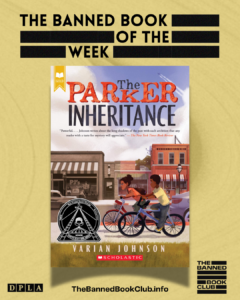 This week’s #BannedBook is an award-winning, middle-grade novel. “The Parker Inheritance” by Varian Johnson is a captivating mystery that blends historical and contemporary themes of race and identity with a clever puzzle at its core. The strong characters, heartfelt friendship, and exploration of America’s history make it a must-read for both young and adult readers (who may recognize Johnson’s homage to “The Westing Game” by Ellen Raskin).
This week’s #BannedBook is an award-winning, middle-grade novel. “The Parker Inheritance” by Varian Johnson is a captivating mystery that blends historical and contemporary themes of race and identity with a clever puzzle at its core. The strong characters, heartfelt friendship, and exploration of America’s history make it a must-read for both young and adult readers (who may recognize Johnson’s homage to “The Westing Game” by Ellen Raskin).
In “The Parker Inheritance”, Candice and Brandon are determined to solve a mystery posed in an old letter addressed to Candice’s grandmother 70 years ago. The challenge leads them deep into the history of their town and their families.
Intrigued and want to dive into the mystery? You can find the eBook and audiobook versions of “The Parker Inheritance” in the Banned Book Club Library on The Palace Project. Download the Palace Project app and access the Banned Book Club Library: https://thepalaceproject.org/app/
“Annie On My Mind” (1982) — Nancy Garden
Banned Book of the Week (Feb. 12, 2025)
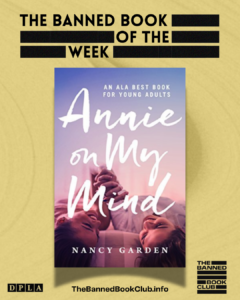 This week’s Banned Book, ‘Annie On My Mind’, was submitted by Otter Bowman, a librarian at Daniel Boone Regional Library.
This week’s Banned Book, ‘Annie On My Mind’, was submitted by Otter Bowman, a librarian at Daniel Boone Regional Library.
‘Annie On My Mind’, by Nancy Garden, paints a vivid, achingly accurate description of young love – which is complicated enough, but can be even more confusing when it forces you to examine your own identity in a new light.
Set in 1980s New York City, ‘Annie On My Mind’ illustrates a pivotal time in queer history where acceptance was far from widespread but there were glimmers of hope. Titular characters Annie and Liza come from vastly different backgrounds but connect instantly when they randomly meet in the Metropolitan Museum of Art. When Liza and Annie meet an older lesbian couple, it helps them realize that their love isn’t automatically doomed to fail.
A gentle story with no graphic content, ‘Annie On My Mind’ is a classic coming of age story with a hopefulness that keeps readers coming back to this story years after its publication.
“And Tango Makes Three” (2005) — Justin Richardson and Peter Parnell
Banned Book of the Week (Feb. 5, 2025)
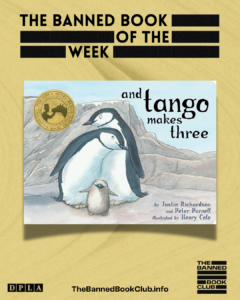 This week we have one of the most adorable #BannedBooks yet: ‘And Tango Makes Three” by Justin Richardson and Peter Parnell!
This week we have one of the most adorable #BannedBooks yet: ‘And Tango Makes Three” by Justin Richardson and Peter Parnell!
Eori Tokunaga, Library Assistant III for Palos Verdes Library District and an aspiring author-illustrator, writes: “Based on the real-life experiences of two male penguins from New York’s Central Park Zoo, ‘And Tango Makes Three’ is a beautifully illustrated picture book that celebrates the love and joy of making a family together through the lives of Roy and Silo. This must-read story explores themes of adoption and same-sex families, perfectly packaged together in an adorable animal book that is sure to appeal to young readers everywhere.”
‘And Tango Makes Three’ is available in Palace as an e-book and as an audiobook!
Recommended by Eori Tokunaga: eoritokunaga.com (web) | @eoritokunaga (Instagram)
“The Charm Offensive: A Novel” (2021) — Alison Cochrun
Banned Book of the Week (Jan. 8, 2025)
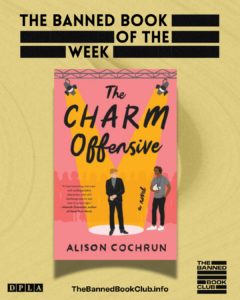 Digital media librarian Fable Sonia-Bolduc submitted ‘The Charm Offensive,’ by Alison Cochrun for this week’s #BannedBook of the week.
Digital media librarian Fable Sonia-Bolduc submitted ‘The Charm Offensive,’ by Alison Cochrun for this week’s #BannedBook of the week.
Fable shared, “This book unlocked the romance genre for me; it was the first time I found the perfect combination of a bombastic premise that caught my eye (the chaos of a workaholic crew member of a reality show accidentally stealing the heart of the eligible bachelor from the contestants), a full cast of lovable and deeply realized characters, and enough real emotion and heartache to pull tears and cheers in equal measure. Now queer romances sit alongside my fantasy and sci-fi on the bookshelf and I am all the richer for it!”
Thank you for sharing Fable! If you’re interested in picking up a copy of ‘The Charm Offensive’, you can head to your local library or to the Palace Bookshelf for a copy.
Have you read ‘The Charm Offensive’?
“The Mindy Kim Series” (2020-2025) — Lyla Lee
Banned Book of the Week (Dec. 19, 2024)
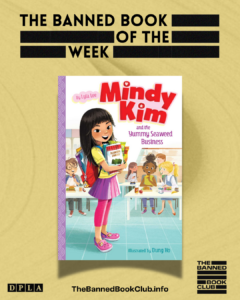
This week, Mary Jo El-Hachem at the Connecticut State Community College Asnuntuck Campus Library submitted the ‘Mindy Kim’ series by Lyla Lee.
An adorable chapter book series reminiscent of Junie B. Jones, the ‘Mindy Kim’ series follows cheerful protagonist Mindy Kim – a Korean-American elementary school student.
Mindy Kim’s stories include moving to a new school, making friends, getting lost, running for class president, and getting a new puppy! In addition to seeing Mindy’s positive and brave approach to solving her problems, readers can enjoy learning about Korean culture including commonly used words, famous dishes and important holidays and traditions. Young readers see themselves in Mindy Kim’s experiences as a young Asian American girl and as an elementary school student.
Head to your local library or to the Palace Bookshelf to read the Mindy Kim series. With 12 books, this series is sure to keep the young readers in your life entertained!
“Ender’s Game” (1985) — Orson Scott Card
Banned Book of the Week (Dec. 11, 2024)
This week’s featured Banned Book is ‘Ender’s Game,’ by Orson Scott Card.
Beloved by readers since its publication in 1985, ‘Ender’s Game’ provides a thought-provoking look at what happens when children are trained and sent to war under the cover of playing a video game, and the high cost of a game with no true winners. The story follows intellectually brilliant (especially at strategy and warfare) Ender Wiggin.
Despite his strategic brilliance, his emotional intelligence hasn’t caught up, and his brushes with bullying, violence, and genocide shape him in unexpected ways. ‘Enders Game’ has faced both book bans and challenges that cite violence, adult themes and religious references. Teachers and educators across the country have read ‘Ender’s Game’ in the classroom and cited it as an anchor text that provokes valuable discussion among its middle-grade audiences.
Have you read ‘Ender’s Game’?
“Captain Underpants” (1997) — Dav Pilkey
Banned Book of the Week (Dec. 4, 2024)
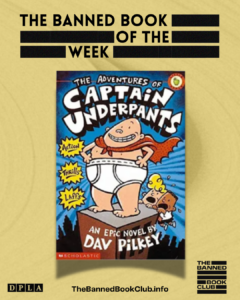
Welcome back to DPLA’s Banned Book of the Week series! This week, Curation Corps Librarians are featuring ‘The Adventures of Captain Underpants’ by Dav Pilkey.
The Adventures of Captain Underpants, and the other 11 books in the series, are irresistible to most kids. Full of potty humor, funny cartoons, and silly jokes, these graphic novels have the power to engage even the most reluctant readers. Best friends George and Harold, who are in fourth grade, accidentally hypnotize their cranky school principal into believing he is a superhero named Captain Underpants. In his traditional red cape and white briefs, Captain Underpants defends the elementary school from a veritable rogue’s gallery of villains and scoundrels.
The Captain Underpants series is sure to keep the young readers in your life captivated and laughing (and they make great holiday gifts). Head to your local library or to the Palace Bookshelf to read Captain Underpants today!
“Wicked” (1995) — Gregory Maguire
Banned Book of the Week (Nov. 20, 2024)
Curation Corps Librarians are excited to share this week’s  Banned Book of the Week Gregory Maguire’s 1995 novel ‘Wicked: The Life and Times of the Wicked Witch of the West’. Before Ariana Grande and Cynthia Erivo played Glinda and Elphaba on film, Kristin Chenoweth and Idina Menzel performed ‘Wicked’ on Broadway.
Banned Book of the Week Gregory Maguire’s 1995 novel ‘Wicked: The Life and Times of the Wicked Witch of the West’. Before Ariana Grande and Cynthia Erivo played Glinda and Elphaba on film, Kristin Chenoweth and Idina Menzel performed ‘Wicked’ on Broadway.
But, before there was even a musical, there was Gregory Maguire’s novel. Inspired by the characters in L. Frank Baum’s ‘The Wonderful Wizard of Oz’, Maguire told the tale of a misunderstood and unloved green-skinned girl named Elphaba, who became the infamous Wicked Witch of the West. Told as Elphaba’s biography, Maguire explores how and why Elphaba became the Wicked Witch of the West. A fantasy-comedy-tragedy that illuminates social disparity and explores the nature of evil, ‘Wicked’ has remained a favorite story among Broadway enthusiasts since its adaptation in 2003. Pick up ‘Wicked’ at your local library or as an ebook on the Palace Project App before you go see the movie this November. Or, check out the Broadway soundtrack! (A note to readers: this novel is thematically darker than its broadway counterpart and was written for an adult audience.)
“Amazing Grace” (1991) — Mary Hoffman
Banned Book of the Week (Sept. 25, 2024)
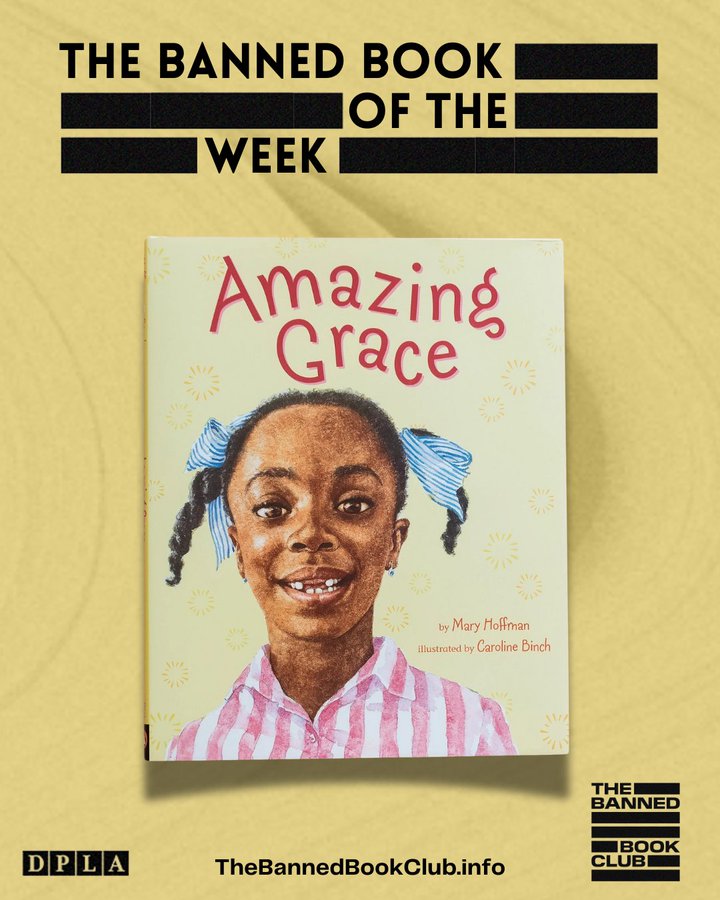
Welcome to another Banned Book Wednesday! This week, Curation Corps Librarians are spotlighting ‘Amazing Grace’ by Mary Hoffman. Since publishing in 1991, this book has been a staple in children’s library collections for its themes of children persisting with their dreams, celebrating their talents, and supporting each other.
‘Amazing Grace’ follows an exuberant young thespian, whose excitement to perform Peter Pan is dampened when a classmate says a black girl can’t play the lead role. A story of calling out discrimination and racism, and finding support in family and community, can you think of any reasons why some people would want this book banned?
“The Sun and Her Flowers” (2017) — Rupi Kaur
Banned Book of the Week (Sept. 18, 2024)
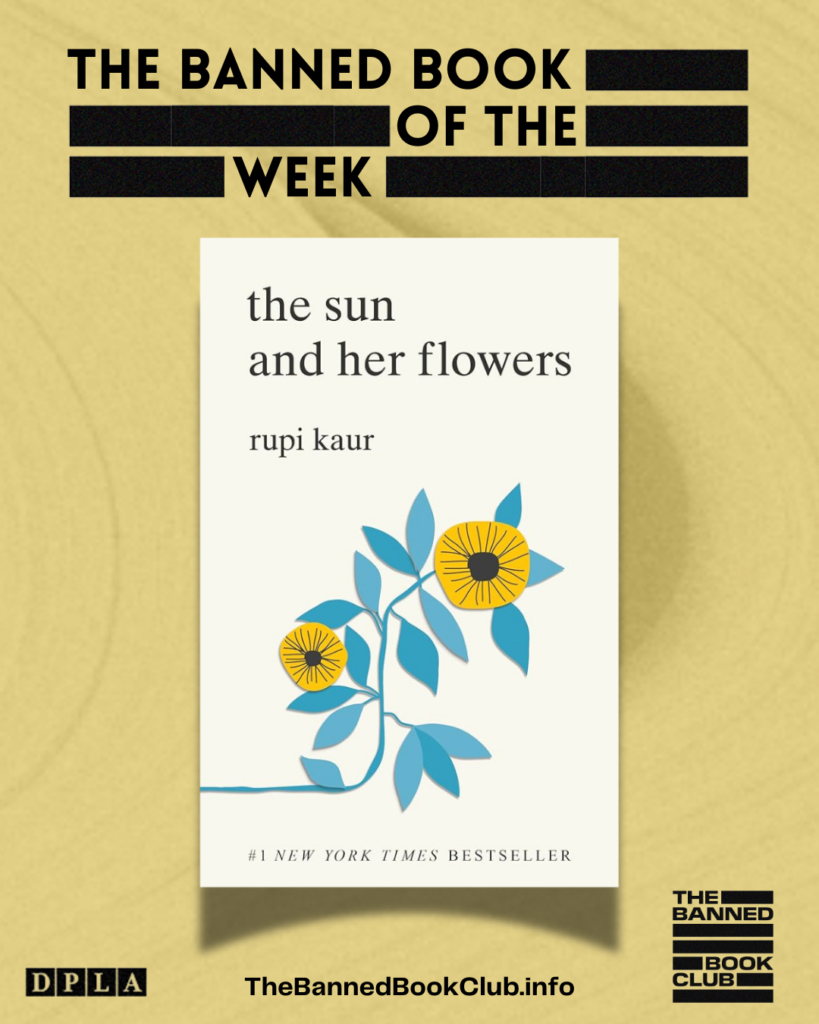
It’s Banned Book Wednesday! This week’s selection, ‘The Sun and Her Flowers’, by Rupi Kaur is a sequel to the best-selling poetry collection “milk & honey” and explores themes of emigration, identity, femininity and sexuality.
Rupi Kaur is a young Indian-Canadian writer whose vivid, accessible poems have gained a loyal following, particularly among female readers. “The Sun and her Flowers” depicts an emotional journey of growth through the metaphor of plant stages: wilting, falling, rooting, rising and blooming. Kaur’s poetry also explores themes of sexual assault, societal expectations of women and feminism.
“The Sun and her Flowers” has been translated into over 43 languages and sold over 11 million copies. Readers around the world have found solace in this book and deserve access to the stories that speak to them.
“Dumplin'” (2015) — Julie Murphy
Banned Book of the Week (Sept. 9, 2024)
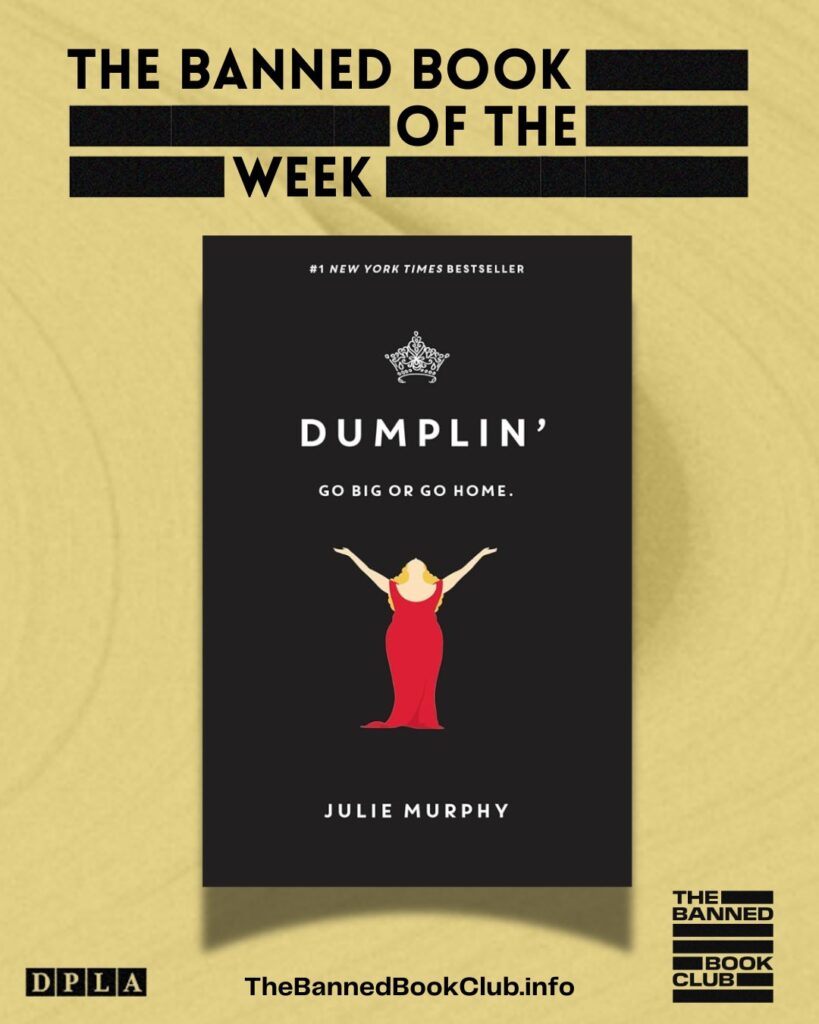
Curation Corps Librarians selected ‘Dumplin’ by Julie Murphy for this week’s Banned Book Wednesday.
‘Dumplin’ follows Willowdean Dixon, a plus-size teenager with a ton of charisma living in a small town in Texas. She decides to challenge societal norms by entering an esteemed beauty pageant that happens to be officiated by her mother, a former beauty queen with exacting standards.
Willowdean is an unforgettable heroine, and the best friend you wish you had. ‘Dumplin’ is an inspirational read for teens that celebrates self-acceptance, friendship, and the courage to defy expectations.
“The Poet X” (2018) — Elizabeth Acevado
Banned Book of the Week (Sept. 2, 2024)
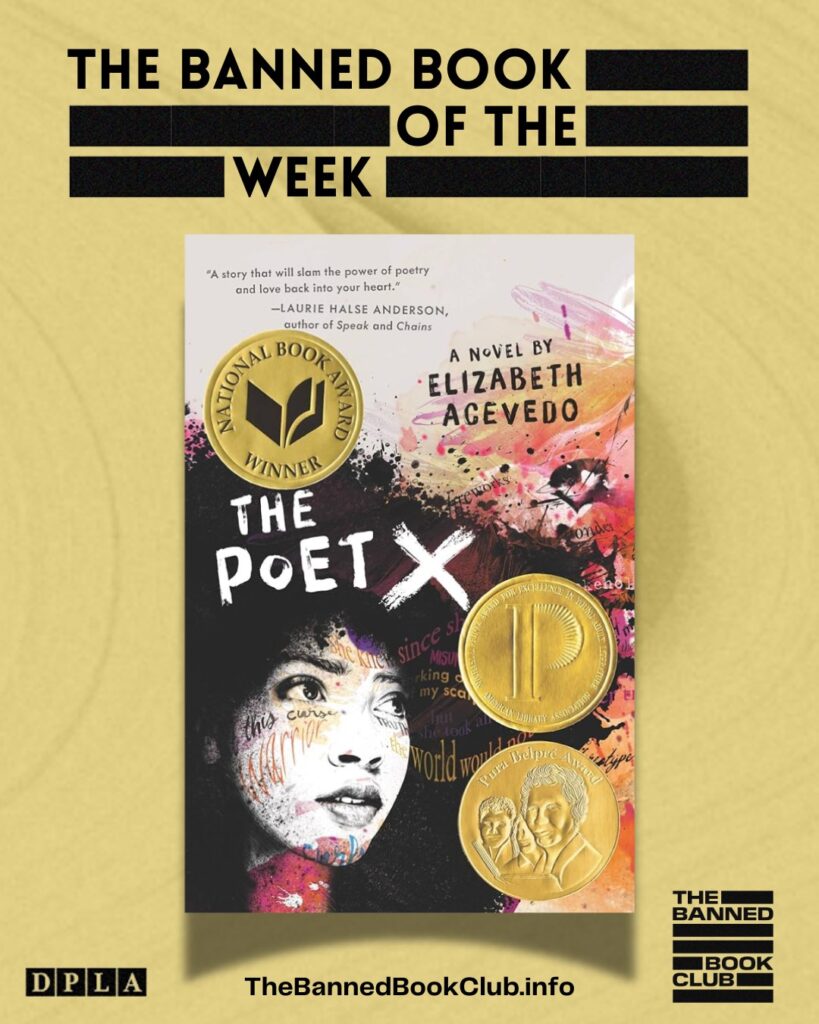
DPLA’s featured Banned Book of the Week is ‘The Poet X’ by Elizabeth Acevedo.
Set in a Dominican household in Harlem, readers meet 15 year-old Xiomara as she discovers slam poetry as an emotional outlet and personal expression. Through powerful and lyrical language, Xiomara shares her struggles with her self-image, romantic interests and her devoutly religious mother.
An award-winning novel in verse, Acevedo wrote this novel in response to her English students’ requests for books with characters like themselves. As a National Poetry Slam Champion herself, Acevedo expertly writes about relationships and identity in verse.
‘The Poet X’ has won the National Book Award for Young People’s Literature, the Michael L. Printz Award, the Pura Belpré Award, the Carnegie medal, the Boston Globe–Horn Book Award, and the Walter Award.
“Amina’s Voice” (2017) — Henna Khan
Banned Book of the Week (August 26, 2024)
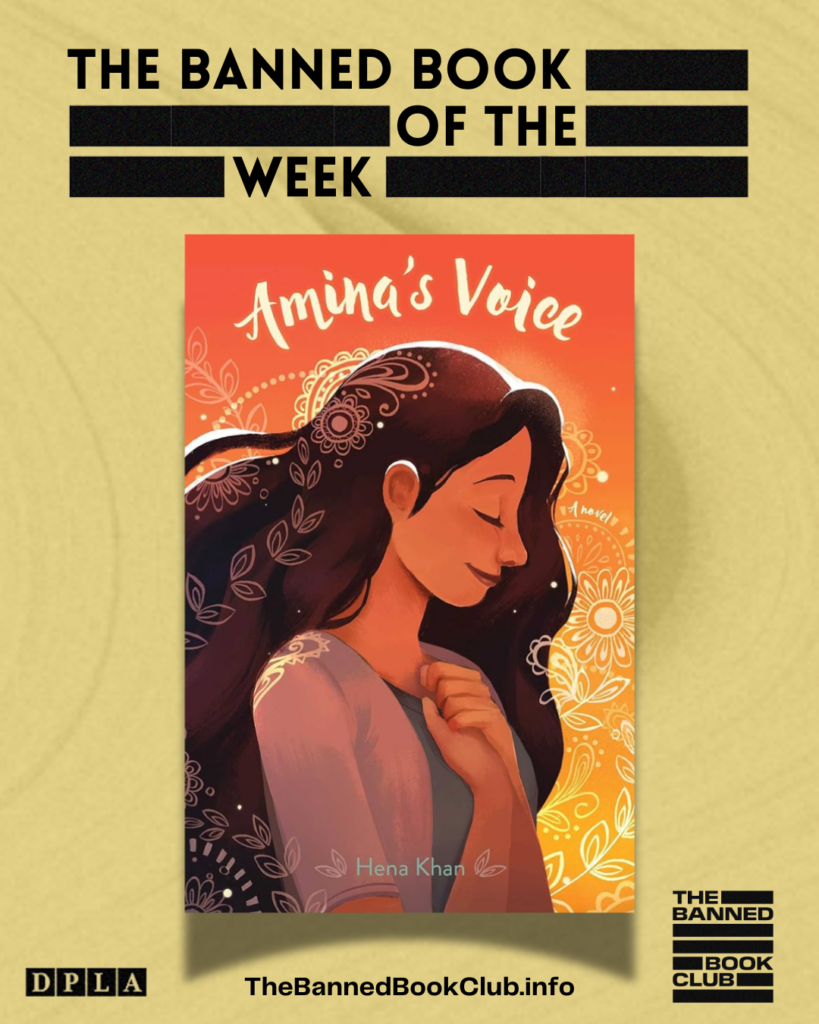
Curation Corps Librarians selected ‘Amina’s Voice’ by Henna Khan for this week’s Banned Book Wednesday.
‘Amina’s Voice’ follows Amina, a shy Pakistani-American girl navigating the complexities of middle school and friendships. When Amina’s local Islamic Center is vandalized, she finds the courage to speak up for her community.
This middle-grade novel is an authentic portrayal of balancing cultural identity with peer acceptance. The characters are well-drawn and relatable, and themes of resiliency, empathy and inclusion resonate with young readers.
“Speak” (1999) — Laurie Halse Anderson
Banned Book of the Week (August 19, 2024)
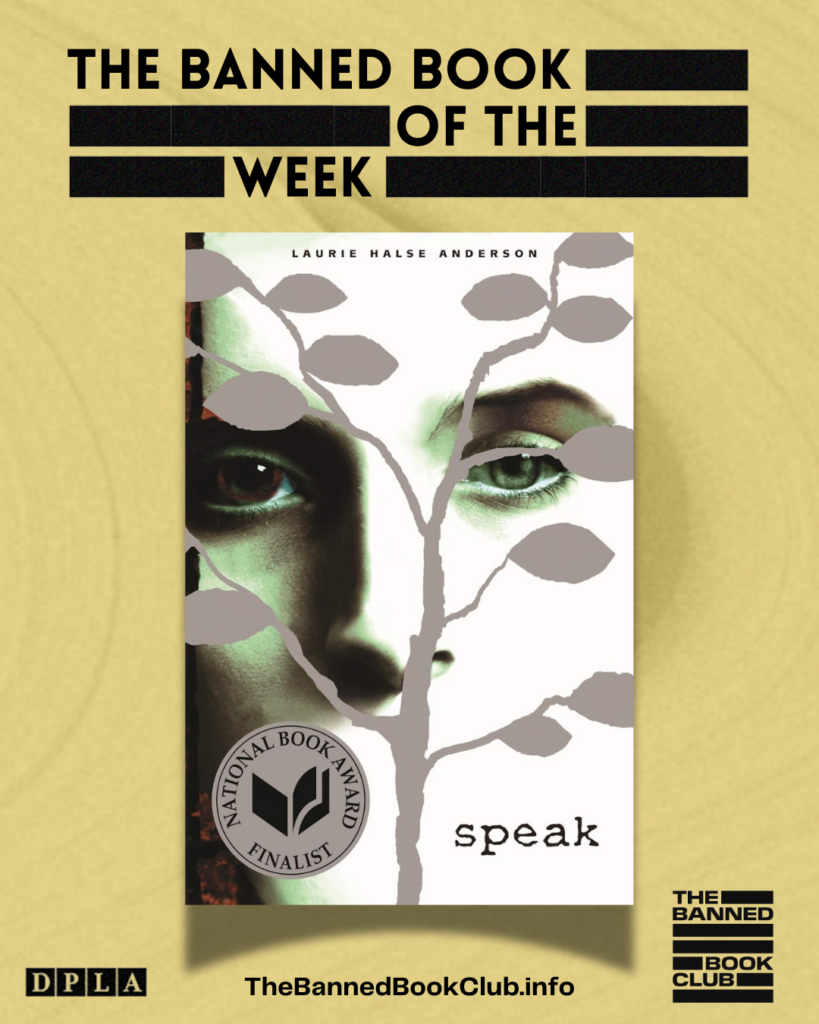
Today’s Curation Corps Librarian Banned Book Wednesday selection is “Speak” by Laurie Halse Anderson.
A highly acclaimed YA novel, “Speak” covers the topic of sexual violence and emotional aftermath. Told through high-school freshman Melinda’s diary entries, readers meet Melinda after she is ostracized by her peers after calling the police at a popular party. Social isolation and post-traumatic stress render Melinda increasingly silent, until she is able to face what happened at the party and bravely speak out against her attacker.
Our Curation Corps librarians say: “Speak is an essential and necessary book to help teenagers understand violation, despair, and recovery.”
“14 Cows for America” (2008) — Carmen Agra Deedy
Banned Book of the Week (August 12, 2024)
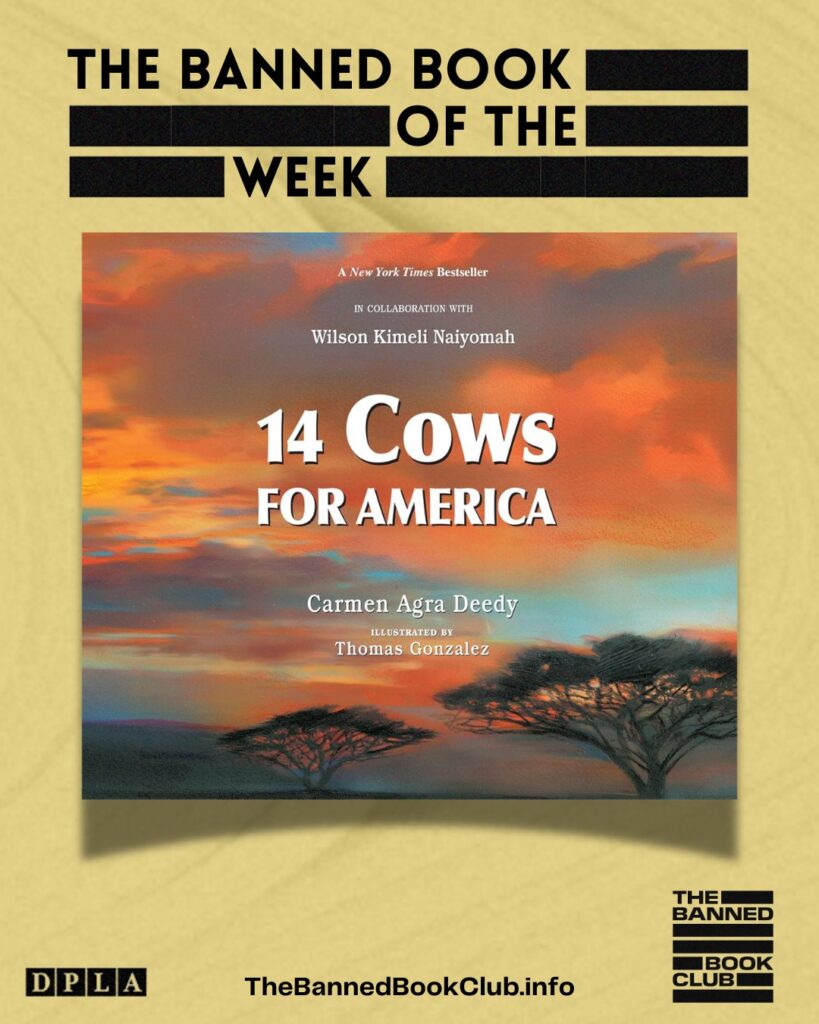
Welcome to another Banned Book Wednesday! Get ready to head to your local library to get this week’s selection, “14 Cows For America” by Carmen Agra Deedy. This beautifully illustrated picture book recounts the true story of a Maasai tribe in Kenya that compassionately gave 14 cows to the United States after the September 11, 2001, attacks.
Here’s why our Curation Corps Librarians love this book: “Depictions of the Maasai culture and Kenyan landscape will captivate young readers while the events of 9/11 are discussed in a sensitive way. Deedy lyrically emphasizes community response and empathy that extends over great distances.”
“Esperanza Rising” (2000) — Pam Muñoz Ryan
Banned Book of the Week (August 5, 2024)
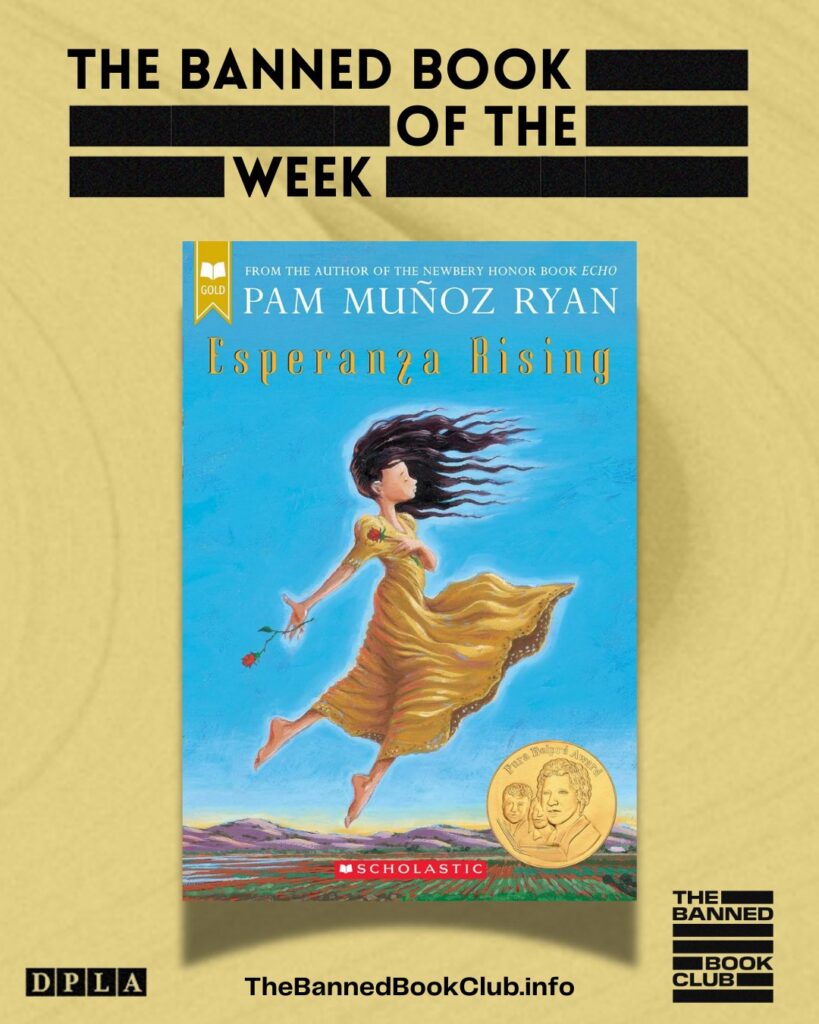
DPLA’s Banned Book Wednesday series spotlights banned books that center experiences, stories, histories and movements. An overwhelming number of banned books center the experiences of Black, Indigenous, People of Color or the LGBTQ+ community. Reading these books supports connection and self-awareness for folks who pick them up, particularly young readers.
This week’s book, “Esperanza Rising” by Pam Muñoz Ryan, is currently banned in Texas and North Carolina. A gripping and inspiring riches-to-rags story, this widely acclaimed middle-grade novel follows 13-year old Esperanza, who is forced to leave her privileged life in Mexico in 1930 to work in a California farm camp.
Here’s why our Curation Corps librarians love this book: “Exquisitely told, this middle grade historical novel colorfully portrays life in the aftermath of the Mexican Revolution, the Great Depression and the Dust Bowl. Perfect for introducing topics of economics, race relations and worker rights to young readers, and for exemplifying resiliency and hope.”
“Patina” (2017) — Jason Reynolds
Banned Book of the Week (July 29, 2024)
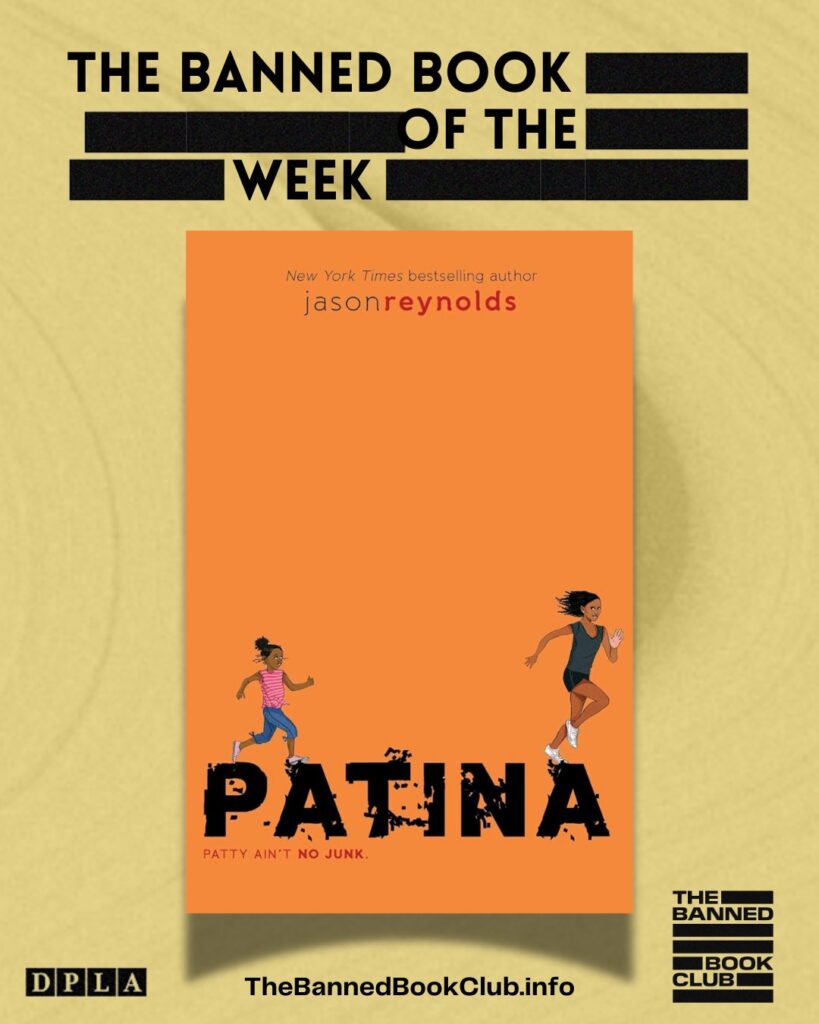
Welcome to another Banned Book Wednesday! Get ready to head to your local library to get this week’s selection, “Patina” by Jason Reynolds. This book is a perfect pick for readers who have been watching the Olympics this summer!
What this book is about: Patina “Patty” Jones, the newest member of the Defenders, an elite middle school track team, is driven to run. Struggling to cope with her father’s unexpected death and mother’s illness, Patty pushes past her daily challenges and finds strength in competition.
Why our Curation Corps Librarians love this book: “Reynolds’s richly drawn protagonist is all at once vulnerable, temperamental, ambitious, funny, and smart. Readers will root for Patty–loyal daughter, dedicated big sister, and gifted student athlete–as she navigates through her grief and discovers her resilience and true worth.”
“The Rough-Face Girl” (1992) — Rafe Martin and David Shannon
Banned Book of the Week (July 22, 2024)
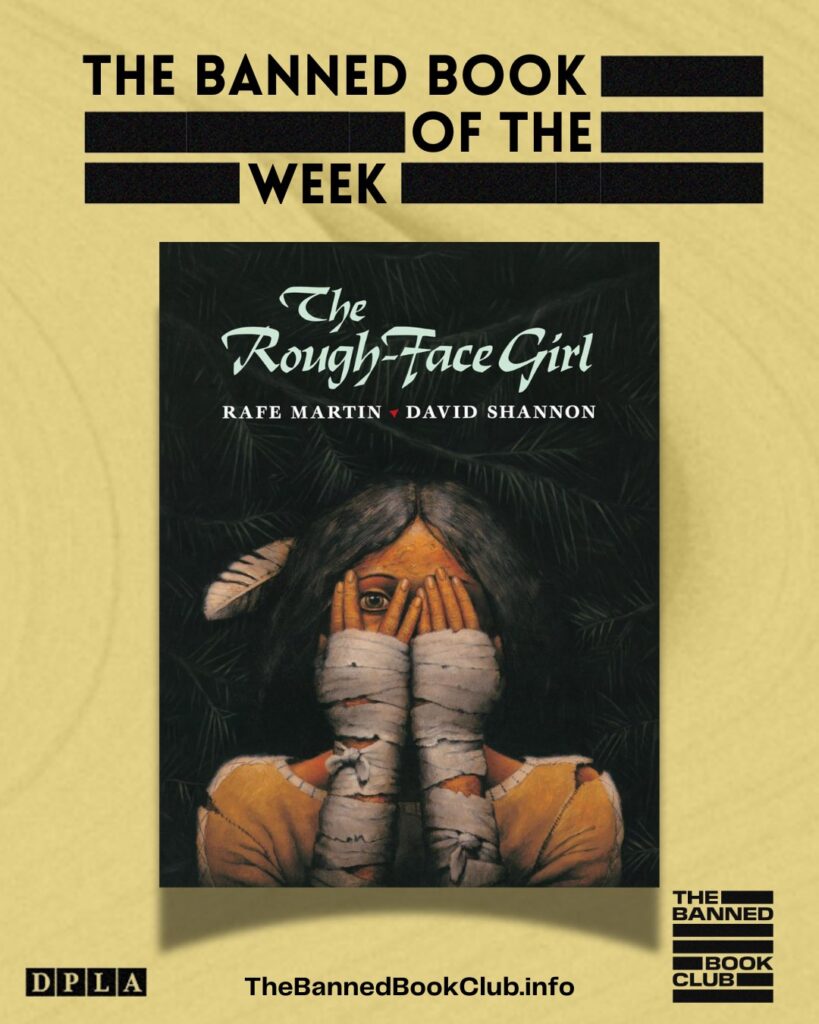
Get your TBR (that’s ‘To Be Read’) list ready! This week, Curation Corps librarians chose “The Rough-Face Girl” for this week’s featured Banned Book of the Week.
In this interpretation of Cinderella, told in the context of Algonquin folklore, Rafe Martin and David Shannon reinterpret the classic fairy tale based on Native American (Mi’kmaq) folklore.
Why our Curation Corps librarians love this book: “Shannon’s hauntingly beautiful illustrations vividly depict scenes of Northeast North American indigenous people, introducing children to lifestyles of the past.”
“Itty-Bitty Kitty-Corn” (2021) — Shanon Hale and LeUyen Pham
Banned Book of the Week (July 15, 2024)
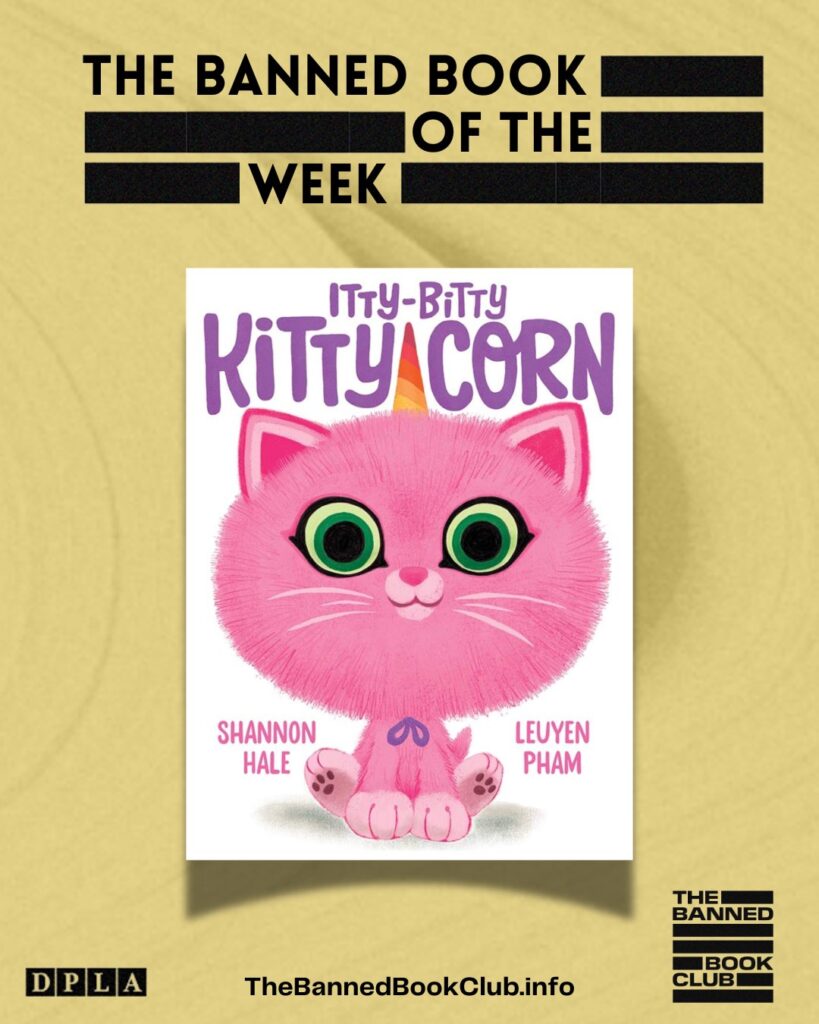
This just might be the cutest Banned Book of the Week! ‘Itty-Bitty Kitty-Corn’ by Shanon Hale and LeUyen Pham follows Kitty’s attempts to neigh and wear a horn – she wants to be a unicorn! Although Kitty is discouraged by Parakeet and Gecko, the fun begins when she meets a purple unicorn who wishes to be a kitty!
The sparkly pink super-cuteness of Pham’s illustrations make this book irresistible. This charming story of friendship, perseverance and acceptance is perfect for imaginative play with children!
“I Am Not Your Perfect Mexican Daughter” (2017) — Erika L. Sanchez
Banned Book of the Week (July 8, 2024)
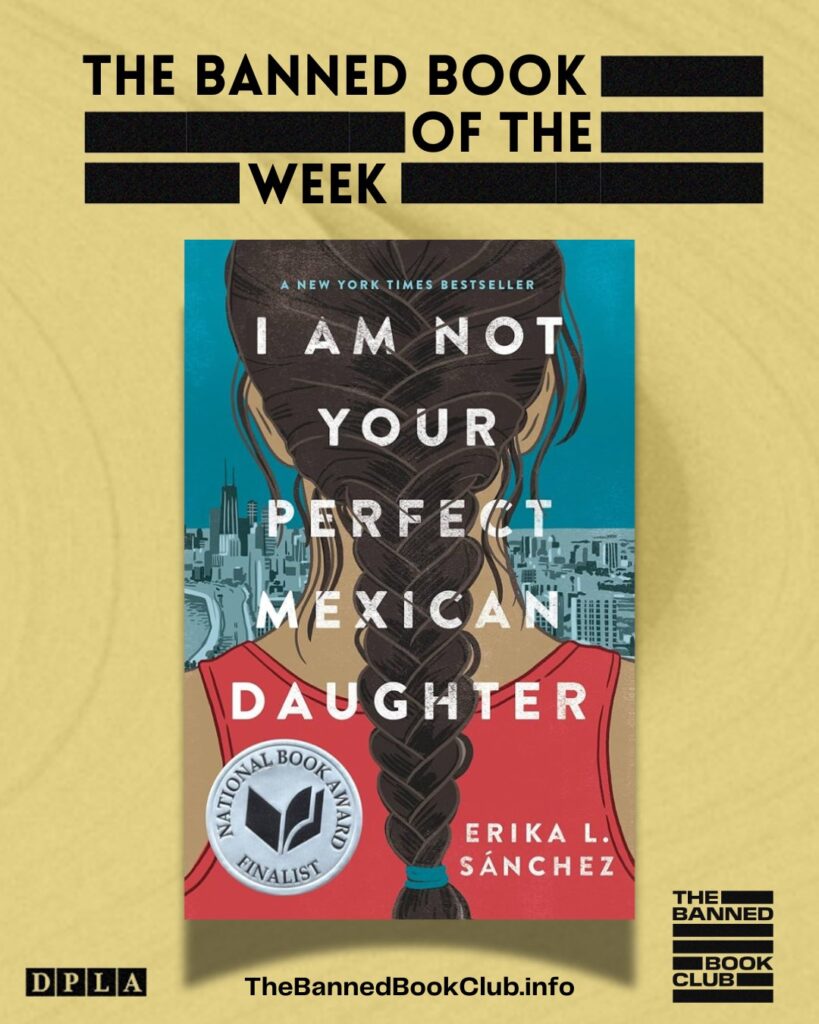
Happy Wednesday – it’s time for Banned Book of the Week! This week, Curation Corps librarian Jill Egan would like to spotlight Erika L. Sanchez’s 2017 novel ‘I Am Not Your Perfect Mexican Daughter’.
Following the sudden death of her older sister, the “good girl” of the family, 15 year-old Julia Reyes becomes brash, rebellious and depressed. Julia narrates her grief, socio-economic issues, cultural expectations and first-generation American struggles with raw emotion that makes this young adult novel widely relatable. In the wake of her grief and the expectations of her traditional Mexican family, Julia navigates her mental health and finding her own identity.
“Refugee” (2017) — Alan Gratz
Banned Book of the Week (July 1, 2024)
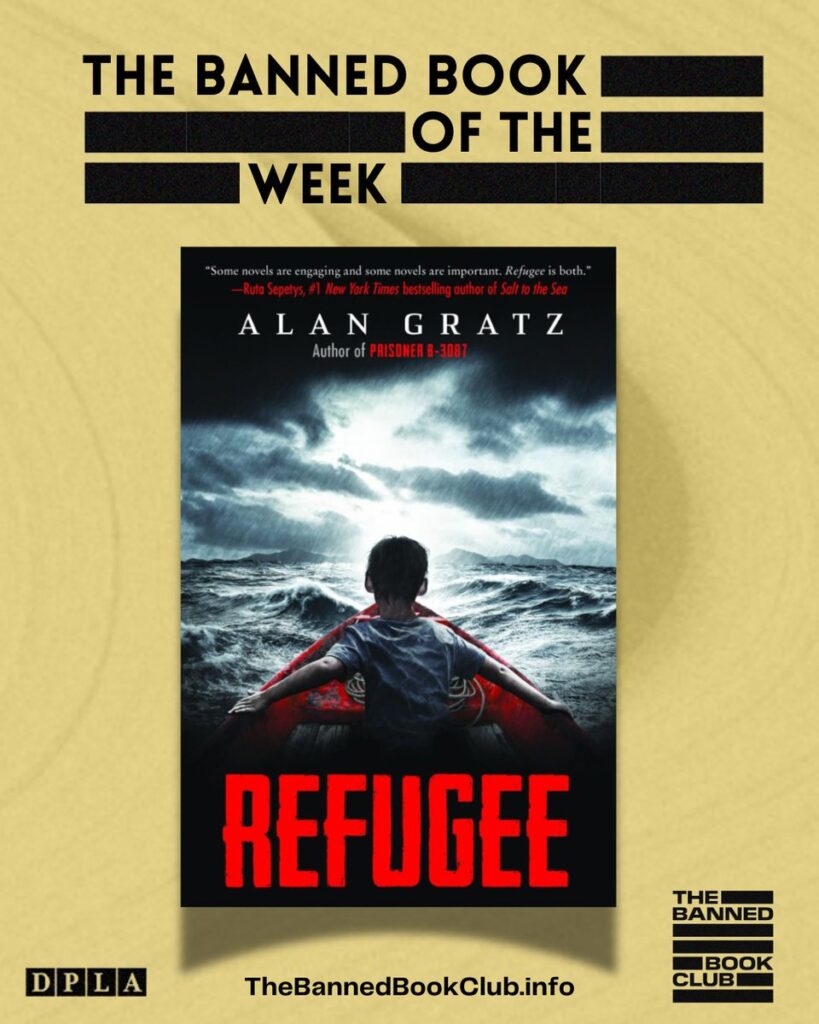
Banned Book of the Week is here! Today, Curation Corps members want to highlight “Refugee” by Alan Gratz.
“Refugee” follows three different kids across different times and places with a common mission: Escape. Joseph is a Jewish boy in 1930s Nazi Germany, Isabel is a Cuban girl in 1994, and Mahmoud is a Syrian boy in 2015. Through alternating points-of-view, the book details each child’s experience fleeing their homes for survival.
While this story may be intense for some young readers, others will be inspired by the characters’ courage and resilience and the ever-present hope of tomorrow. This story is a powerful read-aloud!
“Julián is a Mermaid” (2018) — Jessica Love
Banned Book of the Week (June 24, 2024)
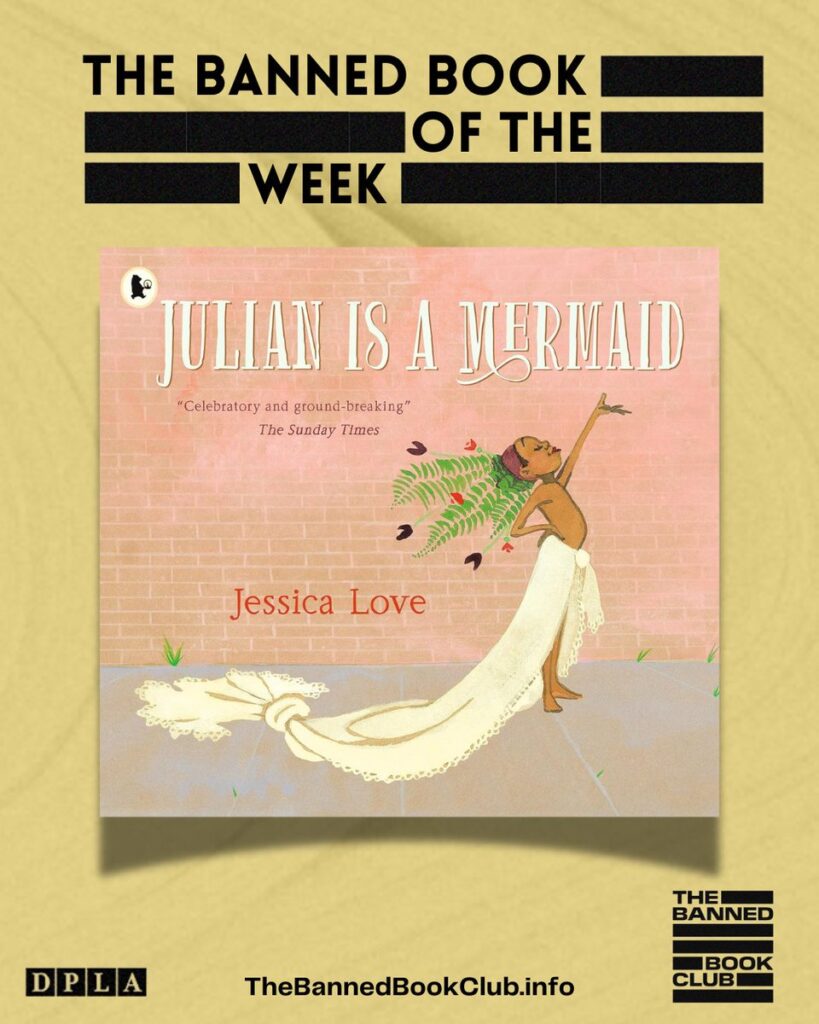
It’s time for Banned Book of the Week! Today’s banned book, “Julián is a Mermaid” by Jessica Love, is a beautiful picture book that portrays a young boy’s fantasy of becoming a mermaid, and his grandmother’s acceptance of his dream.
The book’s artwork inspires readers to think about themes of self-love, individuality and acceptance. Curation Corps members enjoy the vast variety of human experiences the story celebrates in every scene, with illustrations showing Julián glammed up in beads and make-up alongside his abuela. The enchanting pictures throughout this book blur the line between imagination and reality, subtly encouraging self-expression.
“Front Desk” (2018) — Kelly Yang
Banned Book of the Week (June 17, 2024)
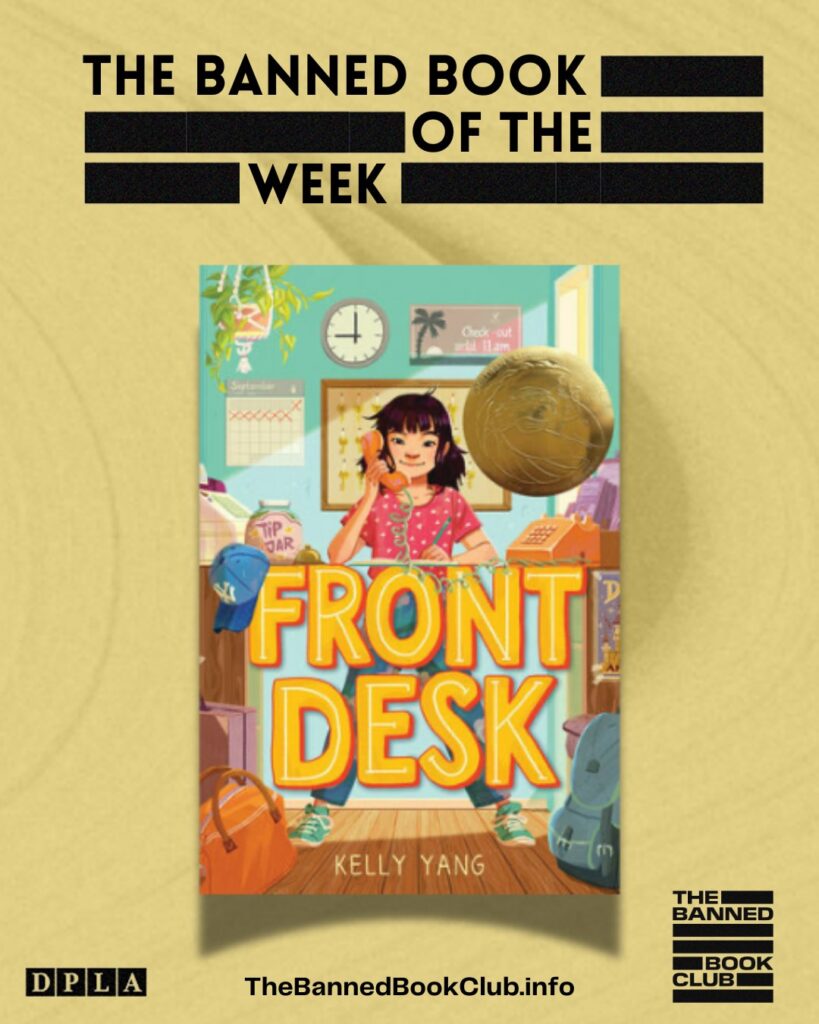
This week’s Banned Book of the Week is “Front Desk” by Kelly Yang.
Equal parts bittersweet and heartwarming, ‘Front Desk’ chronicles the ups and downs of ten-year-old Mia and her Chinese immigrant family as they pursue the American Dream. Readers get to follow along as Mia adjusts to a new school and new responsibilities, like working the front desk of a California motel managed by her parents.
Miriam Tuliao, a DPLA Curation Corps member, says: “‘Front Desk’ is a windows-and-mirrors story that grapples with big themes such as class, poverty, homelessness, and discrimination, while celebrating friendship, family, community and diversity. Yang’s empathic novel offers glimmers of hope and affirms the experiences of immigrant children.”
“Gabi, A Girl in Pieces” (2014) — Isabel Quintero
Banned Book of the Week (June 10, 2024)
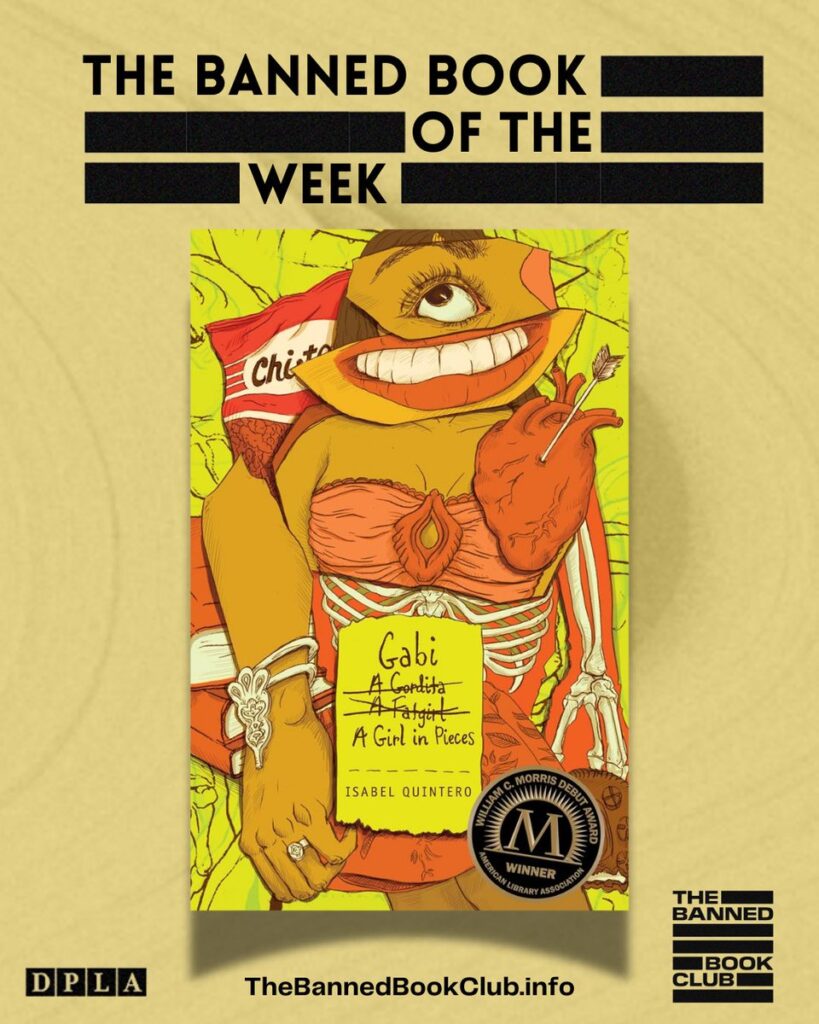
It’s time for Banned Book of the Week! Today, we’re spotlighting “Gabi, A Girl in Pieces”, a YA coming-of-age novel by Isabel Quintero that chronicles Mexican-American Gabi’s tumultuous senior year of high school through her journal entries.
In candid, colorful language, Gabi journals about her pregnant best friend, her father’s struggles with substance abuse and her dreams of going to college to be a writer. Quintero is outstanding at capturing the voice of an ambitious and good-hearted teenager who has a lot of messy, heartbreaking issues in her life. Funny, sad, realistic and relatable!
“Brown Girl Dreaming” (2014) — Jacqueline Woodson
Banned Book of the Week (June 3, 2024)
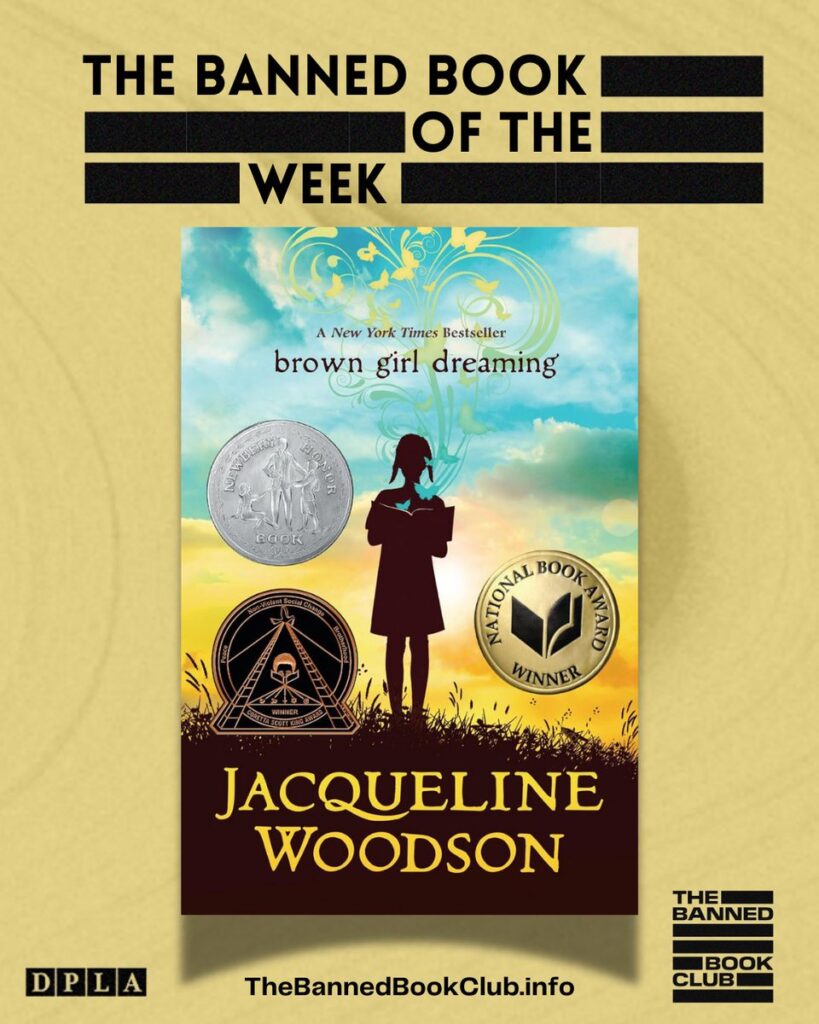
Our second Banned Book Wednesday spotlights “Brown Girl Dreaming” by Jacqueline Woodson.
Published in 2014 by Penguin Young Readers, “Brown Girl Dreaming” is a memoir in free verse. Jacqueline Woodson shares what it was like growing up as an African American girl in the 1960’s and 1970’s, between northern and southern parts of the United States. From witnessing shifts of the Civil Rights Era to navigating family dynamics, Woodson’s story is a fresh take on the coming-of-age genre.
Jill Egan, the DPLA Curation Corps member who serves as the Lead Curator for The Banned Book Club collection explains her pick: “With simple and eloquent chapters of poetry, Woodson takes the reader to other places and times, reveals her unique life experiences, and demonstrates how each one of us is a complex composite of many influences and individuality. It’s perfect for inspiring young readers to explore and tell their own stories, and for appreciating the stories of others. And it’s equally loved by adult readers who detect the emotion and beauty of the words.”
To learn more about this book, please check out the Book Resume from ALA’s Unite Against Book Bans project.
“Separate is Never Equal” (2014) — Duncan Tonatiuh
Banned Book of the Week (May 27, 2024)
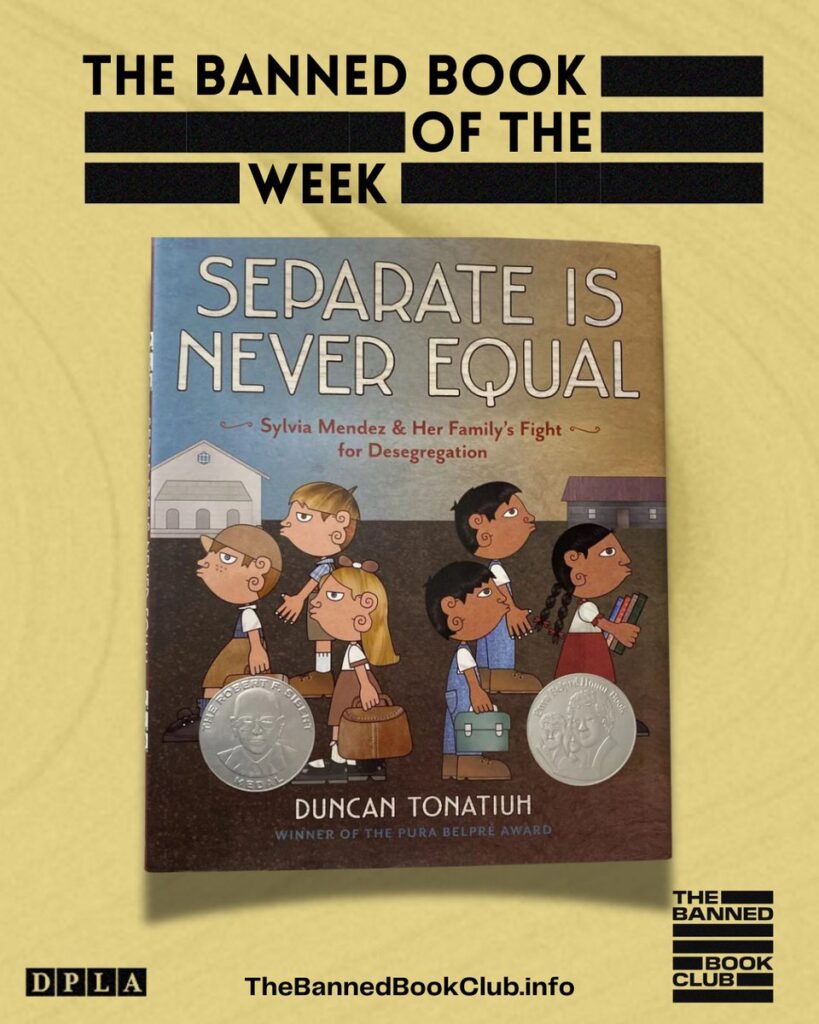
Welcome to Banned Book Wednesday! Our Banned Book of the Week is “Separate is Never Equal: Sylvia Mendez and her Family’s Fight for Desegregation” by Duncan Tonatiuh.
Published in 2014 by Abrams Books, “Separate is Never Equal” shares the powerful, yet little known, story of how the 1946-7 Mendez family lawsuit led to the desegregation of public schools in California, laying the foundation for the landmark Brown v. Board of Education case nearly a decade later.
Jill Egan, a DPLA Curation Corps member and lead Curator for The Banned Book Club collection explains her pick: “The challenge of explaining America’s civil rights evolution to young people can be exacerbated by their limited understanding of economics, labor and other complex systems in which racial discrimination resides. But kids easily grasp the unfairness of segregated schools, making this book an excellent entry point for discussions about race, history and civic participation. This achievement of the Latino community in 1947 deserves much more attention and celebration.”
To learn more about this book, please check out the Book Resume from ALA’s Unite Against Book Bans project.
Have you read this book or shared it with a young reader?
If any of these books piques your interest, download The Palace Project app in the iOS or Play stores and select ‘The Banned Book Club’ library. There, you can gain access to thousands of titles impacted by book bans.
